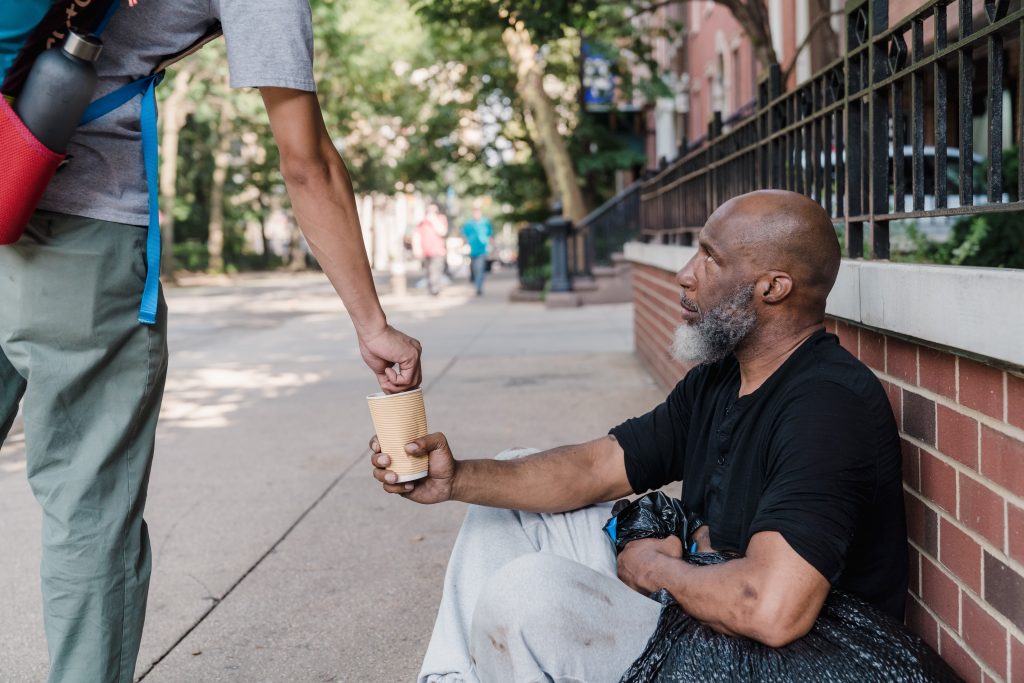The Quran and hadith offer Prophetic guidance regarding the disbursal of our charity and zakat in person, not by proxy.
This enables us to better understand the people we’re helping, know how the money is being put to use, and offer more than just cash.
It’s important to have conversations with those we’re aiming to help, for us to learn more about their condition.
What They Really Need
When we speak with those in need of our support, we learn about their lives and struggles.
Through, a two-minute conversation with a stranger, I often uncovered other less superficial ways to assist.
Perhaps they’re having a hard time with some paperwork or documentation.
Maybe they need a ride to an important health or court appointment.

Perhaps they need a new pair of glasses, bedding, diapers, or clothes for their child, or any other item that is within our budget and means to give.
I was once homeless for a short stretch. When I finally moved into my new apartment with the help of a local homelessness relocation program, I owned next to nothing.
I brought with me a laptop, a few suitcases of personal items, and an inflatable air mattress.
I moved in the winter, so it was crucial that I get some type of home put together for my children and I fast.
However, not a single soul stepped forward to offer me cash.
Instead, they followed Quranic guidance and offered me dishes, cutlery, bedding, used clothing, children’s books, toys, and even some pantry staples.
These ready-to-use items were perfect. I was unable to drive around town and hunt down affordable items.
I had too many other pressing issues like prenatal, and court appointments, demanding my time.
In that moment, their charity was in their gifted belongings, which I accepted with humbled gratitude.
I also have a friend who is a beautician and a hairstylist. She’s trained in more than one discipline and also on various continents.
A Real-Life Story
She’s also known for hardship – which makes her very attuned to others in need.
Recently, she set out to offer free haircuts on weekends to homeless men and women in a downtown park.
Her aim was only to make their lives a little cleaner, fresher, and easier by offering what she could of herself and her expertise to these men and women in need.
However, what she soon discovered, after talking to them throughout their haircuts, is that they needed much more than just one-time grooming.
They needed socks, toothbrushes, toothpaste, soaps, Tylenol, and other toiletries.

She used social media and word of mouth to reach out to others in her circle. She pooled her personal resources along with donations from family and friends.
Together, they put together dozens of well-stocked kits.
When she went back the next time for her usual weekend haircut, she came bearing simple gifts: gifts that were both appropriate and well received.
She took the time to get to know those she was aiming to help.
She learned the depth of their struggles and all the other ways that she, and her friends, could give.
What the Prophet (Pbuh) Did
What she did was guided by her faith, because we have a very similar example from the life of Prophet Muhammad (SAW).

Our Prophet did not condone or encourage beggary as a routine source of income.
However, we are not, as Muslims, supposed to be harsh with beggars either.
As Muslims, our aim is to gently discourage begging and assist others in becoming self-sufficient instead.
In one narration, a man approached Prophet Muhammad begging for money. Prophet Mohammed asked the beggar to instead bring him the belongings that he kept at home.
The man brought back a cloth and a cup. Next the Prophet Mohammed auctioned off the belongings amongst his companions and earned two durham (more than double what the items were probably worth).
He told the man to keep half of the money for his home and family expenses and spend the other half on an axe head.
When the man returned, Prophet Muhammad fashioned the axe head to the handle himself.
He told the man to go cut wood with the axe to sell at the local market and not come back for two weeks.
The man did as he was told. When he returned later, he had earned 10 durhams, and used the money to buy a new blanket and food.
He was also well on his way to earning halal income and achieving financial independence. [Hadith source: Sunan Abu Dawud 1641]
This story teaches a valuable lesson. Except for the rare cases where people are in severe poverty, severe debt, or are too sick or injured to work, we all need a hand up instead of a handout.
When we’re stuck in poverty, it becomes very difficult to see the way out.
Researchers have even observed that poverty changes us in fundamental ways that make it next to impossible to think clearly, resulting in a circular cycle of defeats.
Those outside that spiral can offer valuable advice in the form of guidance, training, and volunteered time – directing the needy out of their poverty and problems.
Prophet Muhammad made a proud man out of a beggar.
He showed him how to cut wood and earn halal stable income for his family expenses instead of begging hand to mouth every day.
As you set out to give for charity and zakat, consider making an extra effort to get to know those you’re helping on a personal level.
Reach out to families directly. Get to know their stories.

Connect them with other people and services. Get them job training, pro-bono legal, medical, and dental work, or just listen to their stories.
Perhaps a listening ear is all they really want and need.
Often, we prefer to hand over a few bucks and look the other way, thinking we’ve done enough.
Instead, the best help is often a hard lift up over the wall of defeat.
***
This article is from our archives.



